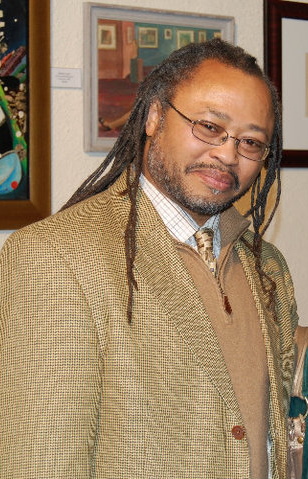
'Olives and Blood' playwright, Michael Bradford.
JODY: What first attracted you to writing about Lorca?
MICHAEL BRADFORD: During the research for a course I was teaching on dramatists at the turn of the 20th Century I became intimately familiar with Federico Garcia Lorca's work. I knew a bit about his poetry, but I was immediately excited to see, on the page and in the descriptions of his direction, how he brought his poetic voice to his plays and eventually to the theatre. I try to create my own work with a poetic base so I was intensely drawn to Lorca's ability to infuse his heightened, beautifully wrought language throughout the wide sweep of genres he explored. The fact that he was murdered so young seemed like a crime beyond the obvious. I imagined the beautiful work we were deprived of because of those men who stood so casually on that hillside in Viznar in 1936 and murdered the poet. All of this compelled me to know more about Garcia Lorca's actual life and death.
JODY: What statement (if any) is the play making by investigating the death/presumed murder of an important literary figure?
MICHAEL BRADFORD: A play tries to say many things. In a larger vein, I am struck by the many stories of artists being censored, at times to the point of murder, in an effort to silence the obvious power of their voice. So I would hope one clear message in this piece is that the voice that resonates and speaks to people at their core exists beyond the flesh of its creator. In essence it exists in the universe, in the collective consciousness of like minded souls. And not even the brutal fact of murder can silence such a thing. Lorca's Niece, Laura Garcia Lorca-Montesinos, has argued for many years against disturbing what may or may not be her uncle's final resting place. I believe the basis for that argument lies in the fact that the men who lined up to shoot Garcia Lorca could not even imagine, over seventy years after his murder, how "alive" the poet would be in the world and how absolutely "dead" they would be. The exact location of the "bones" does not affect that equation.
JODY: how and why do you write?
MICHAEL BRADFORD: I write because it is the action that brings me the closest to my truest self; at least it feels that way! "How" I write is more of a mystery, even to me. I will say that as a writer the rehearsal space of the theatre is where I am most comfortable. I love the struggles and the discoveries that are part and parcel of that process, especially when bringing a new play into existence. I am sure it helps a great deal that I have been fortunate to work with some crazy, beautiful and talented artists along the way. That is certainly the case for this current production. From its first workshop at the Lark Play Development Center to working with director May Adrales and Neighborhood Productions and HERE, the journey to bring OLIVES AND BLOOD to the stage has not been easy, but it has certainly been worth every minute of effort.
JODY: How are you approaching directing Olives and Blood? Can you talk about process and what the casting brings to production?
MAY ADRALES: Before even approaching this play I had a lot to learn. I barely knew a thing about the Spanish Civil War, and I have spent the last few months overloading my brain, working to understand the historical and cultural backdrop of this play. The play is peopled with all historical figures, and I worked to learn everything I could about each. And I spent much time reacquainting myself with Lorca's work. At the core of the play, we are watching the presumed murderer of Lorca, Luis Trescante, try to define the meaning of his life. The play brings historical fact, complex characters, but most importantly, celebrates the music and poetry that Trescante tried to defeat. The production is fused with alternate realities, poetry and most significantly music. The play reminds me of the enduring power of art and poetry and I want the audience to leave with that confidence that somehow despite powerful violent regimes, military take over, the voice of music and art can never be silenced.
The cast is a dream -- they teach me about the play every moment in rehearsal. They aren't afraid to challenge me and text and have made the production stronger.
JODY: What is it like working on a story about the presumed murder of a prolific writer?
MAY ADRALES: This is precisely the aspect that drew me to this play. What kind of man would pride himself on the senseless murder of a poet and artist? The trick of the production is to make the character of Trescante so complex and multidimensional that he can elicit empathy, pity, revulsion and disgust throughout the play. If we discount him too easily as merely a "force of evil," then there is no drama.
JODY:: Do you think there is are enough opportunities for women directors and what advice would you give to other female directors?
MAY ADRALES:I am not sure if there are enough opportunities to go around for directors, regardless of gender - period. But I would admit that opportunities for women are hard to come by on a professional level. Theater likes to go with known entities, and unfortunately, that happens to be a lot of older men. But I have hope in the next wave of artistic leaders that the tide will change. As for advice, I'm still learning the ropes, but be passionate about what you do, only do work that will help expand your mind and bring yourself to the work you do. No one does theater for the money!
For more information or to purchase ticket to Olives and Blood playing at HERE June8-24th please visit http://www.neighborhoodproductions.org/

